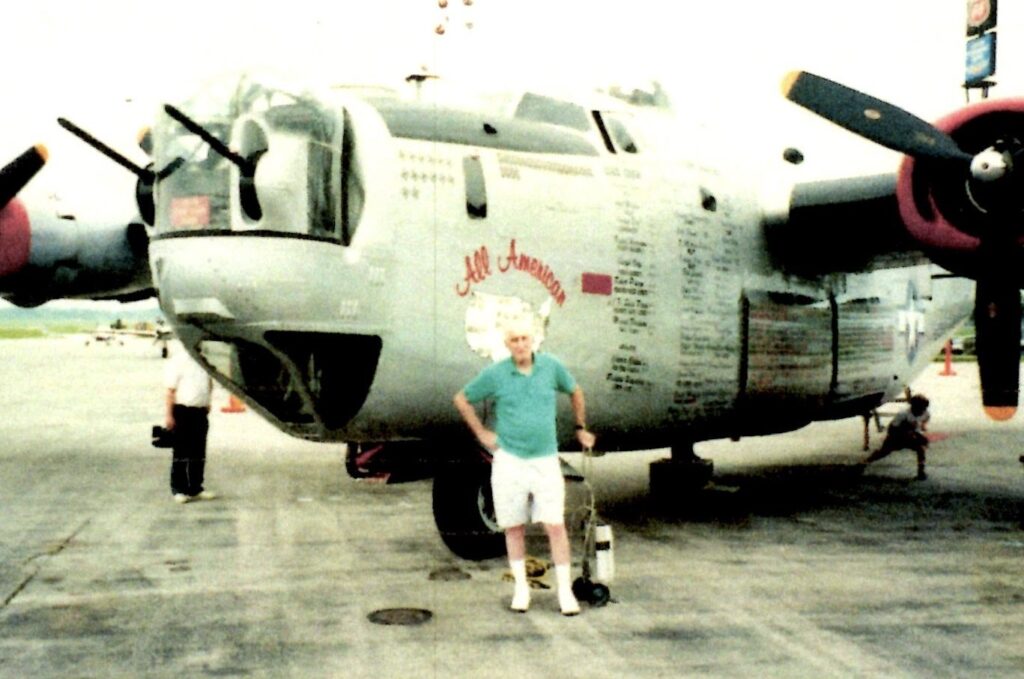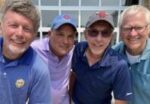Much has been written about “The Greatest Generation” since Tom Brokaw used the description for his best-selling book celebrating the accomplishments of the young men and women who helped save the world in World War II. I hope you’ll indulge me as I tell you about my father, David A. Sullivan.
Dave was born February 22, 1921, in Chicago, the oldest of David M. and Helen Sullivan’s five children. Dad’s mother passed away when he was only 13, so he and his siblings grew up during the Great Depression on Chicago’s South Side under the strict grip of their father, an engineer for Santa Fe Railroad between Chicago and California.
To ease some pressures at home, Dave and his brother Jack were sent to St. Bede Academy, a boarding school in LaSalle. Illinois. Soon after leaving St. Bede, his nomadic itch needed to be scratched and he hopped aboard a westbound train with a dream of settling in California. He stopped along the way for weeks at a time to earn money by washing dishes, bagging groceries, etc., so he could complete his journey.
As it did for so many young people at the time, however, World War II ruined his plans and he returned to Chicago and joined the Army Air Corps, which later became the United States Air Force. Basic training came and went, and Dave was assigned to a base in England to become a radio operator and gunner on a B-24 Liberator.

As is typical of that generation, Dad never spoke about his wartime experiences and kept his medals in a drawer under his socks and handkerchiefs, right next to his tie clasps. He later explained to me, “It wasn’t the romanticized John Wayne movie we tend to think about today.”
His silence continued until he saw “Memphis Belle,” the 1990 film starring Matthew Modine and Harry Connick Jr. Dad said the film captured “fairly accurately” what he and his crewmates experienced. They watched up to 300 bombers and fighters take flight on any given day, knowing about half of them and their crews wouldn’t return. During their missions, the enemy relentlessly tried to knock them out of the air and when they looked through their sights, “We knew innocent people were being killed with every bomb. It was very emotional, to say the least.”
About two weeks after he saw “Memphis Belle,” my seven siblings and I received a handwritten list of his missions, complete with the planes’ nicknames, the destinations and duration of the flights, the number of scrubbed and aborted flights, etc. It reads like a one-page history lesson of World War II, with city names like Berlin, Dusseldorf, Reutlingen, etc. In the margin, he wrote that his plane “Male Call” was severely damaged during the Battle of the Bulge and was forced to land in France.
In his inimitable humility, Dad sent the flight log along with a note, “I never thought you guys were interested in what I did in the war. Not sure why this is interesting to you, but here you go.” Thanks to his skilled crew, a whole lot of luck and maybe even some divine intervention, he completed his required 35 missions and was honorably discharged in 1945.
Dad oozed all things Chicago and joked that his claim to fame was that he once sat behind Three Stooge Moe Howard at a Bears’ game in the early 1950s. (“No, he didn’t poke me in the eyes or hit me with a frying pan…”) After the war, he and Mom settled in the west side of Chicago, near Oak Park. He adored anything to do with words, and even published a neighborhood newspaper in Chicago for a while.
He took a job with Dr. Scholl’s in Chicago until his brother Jack asked him to join the fledgling J.G. Sullivan Advertising in some town called South Bend. Mom, Kathleen “Kay” Sullivan, knew Notre Dame was in South Bend but wasn’t sure whether electricity or running water had even been introduced “in the sticks.” In 1958, they packed their seven kids into a station wagon – child No. 8 arrived in 1963 — and whatever they could fit into a truck and headed 90 miles east.
Ironically, the last plane on which he flew in WWII was dubbed “The Spirit of Notre Dame,” a place he never saw before 1958. So 13 years after his discharge, he lived within five miles of campus. And much to Mom’s relief, electricity and running water were in abundance. They never left.
In the 1980s and well into his 70s, Dad got a chance to take grandsons Brian and Dan to the South Bend airport to tour a World War II-era B-24. He wrote a caption for the photo — on his manual typewriter, of course — that read, in part, “On those missions, the crew was on oxygen when they flew above 12,000 feet. 50 years later, Dave is back on oxygen but now at ground zero.”
Dad passed away in 2001 and Mom joined him in 2011. We miss their humor, their quiet leadership, their undying faith, their impressive dancing skills and their passion for being good people. Their children, grandchildren and great grandchildren inherited their appreciation of wit and their unquenchable thirst for the perfect sentence.
We thank Dad for sharing his wartime exploits with us, albeit decades later. We’ll never know everything he experienced, of course, but I know he meant it when he told me, “War is awful. We should do everything we can to avoid it.”
It’s only fitting that Dad regularly closed conversations with a simple wish for all of us based on what he lived through. “Peace.”
